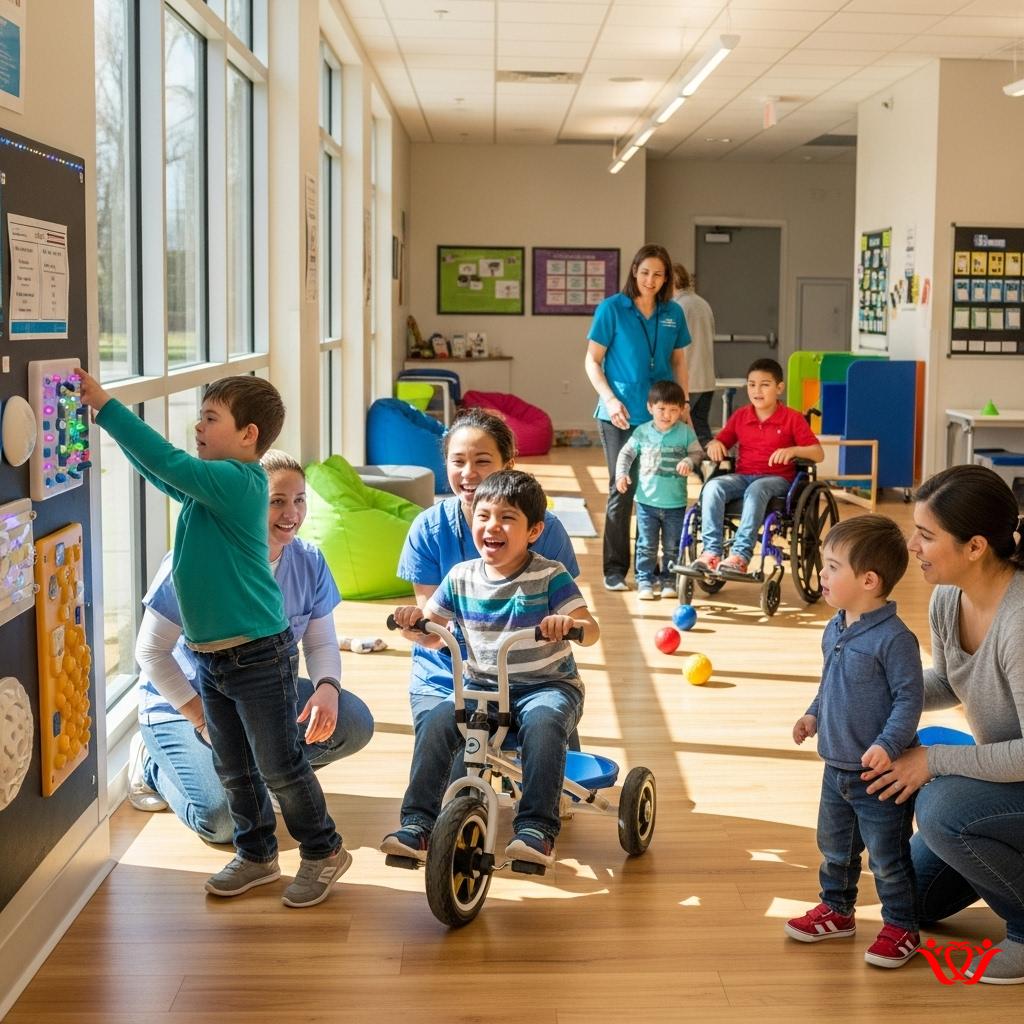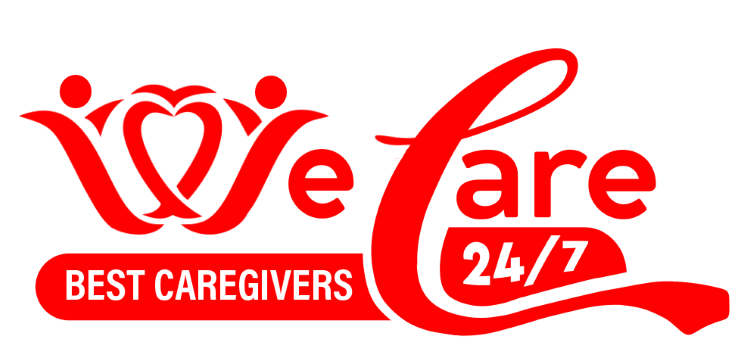NJ Community Update: Adaptive Equipment for Kids’ Success

Bridging Generations: Empowering New Jersey’s Youngest Through Adaptive Equipment
At WeCare Home Caregivers, our commitment extends beyond providing exceptional in-home support for seniors and adults in New Jersey. We understand that caregiving is a multifaceted journey, often impacting entire families and communities. For adult children navigating care options for their parents, or individuals dedicating themselves to care for a loved one with disabilities, the landscape of support and independence is expansive. This month, we shine a light on an inspiring aspect of community support: adaptive equipment for children with disabilities, a subject that resonates with the broader mission of enhancing lives and fostering independence for all New Jerseyans.
The journey of a child with disabilities, and their dedicated caregivers, involves unique challenges and triumphs. Adaptive equipment serves as a powerful catalyst, transforming potential obstacles into pathways for growth, learning, and active participation. It is a testament to human ingenuity, designed to level the playing field and ensure every child has the opportunity to thrive within our vibrant New Jersey communities.
Understanding Adaptive Equipment: More Than Just Tools
Adaptive equipment encompasses a vast array of specialized devices and technologies designed to help individuals with disabilities perform tasks more easily and safely. For children, this equipment is tailored to their developmental stages and specific needs, aiming to improve mobility, communication, learning, and daily living skills. Consider it an extension of their capabilities, enabling them to engage more fully with their environment and peers.
From the first steps taken with a gait trainer to the joy of independent play facilitated by a specialized toy, adaptive tools are instrumental. They reduce reliance on others for basic functions, promoting self-reliance and boosting confidence. This emphasis on self-sufficiency echoes the goals we hold for our senior clients: maintaining dignity and independence within their homes and communities.
Categorizing the Innovations: A Look at Diverse Adaptive Solutions
Adaptive equipment for children is incredibly diverse, addressing various aspects of development and daily life. Understanding these categories can help caregivers, parents, and even grandparents identify potential solutions for their loved ones or gain insight into the resources available in New Jersey.
- Mobility Aids: These include specialized wheelchairs, standers, gait trainers, and walkers that provide support, stability, and the ability to move independently. Imagine a child navigating their school hallway or a local park with greater ease, thanks to a custom-fitted mobility device.
- Communication Devices: For children with speech impairments, augmentative and alternative communication (AAC) devices are life-changing. These range from simple picture boards to sophisticated electronic devices with voice output, allowing children to express their thoughts, needs, and desires.
- Learning and Educational Tools: Adaptive equipment in this category can include specialized seating, ergonomic desks, adapted keyboards, screen readers, and tactile learning materials. These tools create an accessible learning environment, ensuring every child can engage with educational content and participate in classroom activities.
- Daily Living Aids: These devices assist with everyday tasks such as eating, dressing, bathing, and personal hygiene. Examples include modified eating utensils, dressing aids, and accessible bathing equipment, all designed to promote independence in self-care.
- Recreational and Play Equipment: Adapted swings, tricycles, and sports equipment allow children with disabilities to participate in play and recreational activities alongside their peers, fostering social connections and physical development.
The Profound Impact of Adaptive Equipment on Children and Families
The benefits of adaptive equipment extend far beyond the child who uses it. They ripple outwards, positively influencing families, caregivers, and the community at large. For New Jersey families, these tools are not just devices; they are enablers of a richer, more integrated life.
- Enhanced Independence and Autonomy: When a child can feed themselves, move around, or communicate their needs without constant assistance, their self-esteem soars. This newfound independence reduces caregiver burden and allows the child to take ownership of their own life.
- Improved Participation in Education and Social Settings: Adaptive equipment ensures children can attend school, participate in extracurricular activities, and engage with friends. This inclusion is vital for social development and a sense of belonging within the community.
- Reduced Caregiver Strain: For parents and other caregivers, adaptive equipment can significantly lighten the physical and emotional load. Lifts, modified bathing equipment, or easy-to-use communication devices mean less physical exertion and improved safety for both child and caregiver. This can free up time for caregivers to focus on other aspects of family life or even personal respite.
- Promoted Physical and Cognitive Development: Many adaptive devices are designed to support proper posture, reduce risk of injury, and facilitate movements that strengthen muscles and coordination. Communication devices can also stimulate cognitive development by encouraging language acquisition and expression.
- Increased Safety: Specialized equipment can prevent falls, reduce the risk of pressure sores, and ensure a secure environment, whether at home, school, or in public spaces. This peace of mind is invaluable for caregivers.
Navigating Resources and Support in New Jersey
New Jersey is home to a robust network of organizations and programs dedicated to supporting children with disabilities and their families. Accessing adaptive equipment often involves understanding these resources and the pathways to securing necessary devices. This information can be particularly helpful for adult children looking to support their younger relatives, or for caregivers navigating complex systems.
Many families begin by working with their child’s healthcare providers – pediatricians, occupational therapists, physical therapists, and speech-language pathologists. These professionals can assess a child’s needs, recommend appropriate equipment, and provide documentation for insurance or funding applications. Early intervention programs, such as those through the New Jersey Department of Health’s Early Intervention System, are often a first point of contact for families of infants and toddlers with developmental delays or disabilities.
Funding and Procurement: Key Considerations for NJ Families
The cost of adaptive equipment can be substantial, making funding a significant concern for many families. Fortunately, several avenues exist to help New Jersey residents cover these expenses:
- Private Health Insurance: Most private insurance plans cover some portion of medically necessary durable medical equipment (DME). It is essential to understand your policy’s specific benefits, deductibles, and co-pays. Pre-authorization is often required.
- Medicaid/NJ FamilyCare: New Jersey’s Medicaid program (NJ FamilyCare) provides comprehensive health coverage for eligible low-income individuals and families, including children with disabilities. It often covers a broad range of adaptive equipment. Information can be found on the NJ Department of Human Services website.
- State Programs: Various state-funded programs and waivers may offer additional support. For instance, the Division of Developmental Disabilities (DDD) in New Jersey provides services and supports to eligible adults with intellectual and developmental disabilities, and while primarily for adults, understanding its scope can inform how younger individuals transition into adult services.
- Non-Profit Organizations: Numerous charities and foundations focus on providing financial assistance or equipment directly to families. Organizations like the United Cerebral Palsy of New Jersey or local chapters of national disability organizations often have grant programs or equipment loan closets.
- School Districts: For equipment needed within an educational setting, such as specialized seating or communication devices for classroom use, school districts are often responsible for providing these as part of a child’s Individualized Education Program (IEP) under the Individuals with Disabilities Education Act (IDEA).
It is always advisable to work closely with a case manager, social worker, or financial counselor who specializes in disability services to navigate these complex funding mechanisms.
The WeCare Home Caregivers Perspective: A Holistic View of Community Well-being
While WeCare Home Caregivers specializes in in-home assistance for seniors and adults, our broader mission is deeply rooted in enhancing the well-being of the entire New Jersey community. We understand that caregiving responsibilities often span generations. A grandparent receiving care from us might have a grandchild benefiting from adaptive technology, or an adult child arranging senior care might also be navigating the world of pediatric disability services for their own children.
Our commitment to providing compassionate, professional caregivers means we appreciate the nuances of different care needs. We recognize the dedication of caregivers for individuals with disabilities, understanding the physical and emotional demands involved. The principles of promoting independence, dignity, and a high quality of life that guide our senior care services are universal. They apply equally to empowering a child to use an adaptive device for the first time, enabling them to connect with the world around them.
We believe that a strong community supports all its members. By highlighting advancements and resources for children with disabilities, we aim to contribute to a more informed and interconnected New Jersey. Every success, every step towards greater independence for a child in our state, reflects a collective triumph that benefits us all.
Looking Ahead: Continuing Progress and Support
The field of adaptive equipment is constantly evolving, with new technologies and innovative designs emerging regularly. This ongoing progress promises even greater opportunities for children with disabilities to achieve their full potential. As these advancements continue, so too will the need for informed advocacy, community support, and accessible resources.
WeCare Home Caregivers remains dedicated to being a trusted resource for New Jersey families. Whether you are seeking care for an aging parent, managing caregiving responsibilities for a family member with disabilities, or simply looking to understand how to better support your community, we are here. Our goal is to ensure that every individual, regardless of age or ability, can experience a life of comfort, dignity, and independence within their home and beloved New Jersey.
For more information on senior home care services or to discuss how WeCare Home Caregivers can support your family, please visit our services page or contact us directly. We are proud to be a part of New Jersey’s caring community, where every individual’s success is celebrated.



